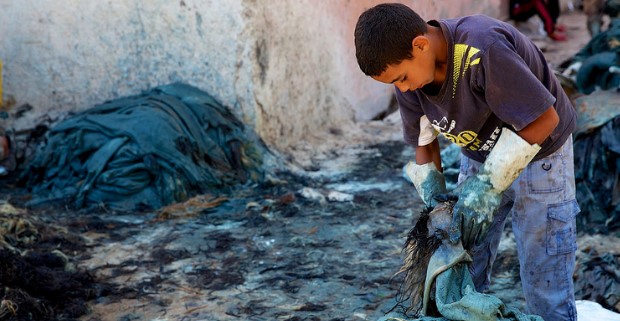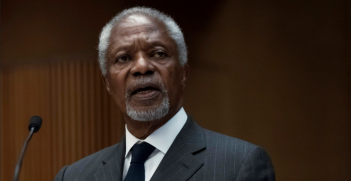Modern Slavery in the Middle East

The Middle East and North Africa region is a volatile breeding ground for modern slavery. With government policies that promote the kafala system exploiting workers’ rights and allow forced marriages to become the cultural norm, it is important to look at how they are holding the region back from achieving its development potential.
The recently released Global Slavery Index 2016 revealed two facts that, when combined together, worry me the most about the development and future of the Middle East and North Africa (MENA) region. First, it states that, “Though MENA continues to act as a destination for men and women from Asia and Sub-Saharan Africa…increasingly Middle Easterners themselves faced exploitation and slavery in 2016.” It reports on Syrian victims of forced labour in agricultural sectors in Lebanon, Egyptian men exploited on Jordanian farms and of forced child marriages. Second, it reveals that war has increased the vulnerability of people to modern slavery. It reports on forced recruits, including children from Syria, Iraq, Palestine and Yemen, by state and non-state armed groups. It reports how children are used as human shields and women and girls captured by Daesh are used as spoils of war.
In a volatile region which has not committed to ending modern slavery and in many areas condones it, more people will continue to be victims of slavery. I cannot help but ponder whether if MENA governments, businesses and societies had previously been more committed to combating modern slavery, would the region be in a better position to fight it in the face of all the chaos? Could we have saved ourselves from increasingly becoming victims of slavery?
More than ever, it is time for the region to rise against modern slavery. This will entail the region’s governments creating strong legislation to fight it, businesses cleaning up their supply chains and societies becoming conscious consumers. Whether modern slavery is robbing the freedom of an Ethiopian woman trapped in domestic servitude or an 11-year-old Moroccan child sold into forced marriage, the reality is that anyone can fall victim to modern slavery because we have failed to abolish it. After all, greed and profiteering off someone else’s back has no boundaries.
Similar to the 2014 report, the 2016 Global Slavery Index highlights that Qatar has the highest proportion of its population in modern slavery when compared to other countries in the region. This is especially troubling because international organisations and the United Nations continue to shine the spotlight on Qatar to become more active in combating modern slavery. Several anti-slavery campaigns were launched to capitalise on the world’s attention on the World Cup 2022 to be held in Qatar. However, it seems that Qatar and Western countries alike are able to accept the fact that at least one migrant worker dies every day during construction of the World Cup stadiums due to poor working and living conditions.
The underlying culprit is the kafala or sponsorship system that binds the worker to the employer, making it very difficult to terminate contracts or change employers, even when employers are abusive and negligent of workers’ rights. It should be noted that workers from Arab countries in skilled jobs also complain about the kafala system, although its effects on skilled workers is less life-threatening as they presumably have stronger economical means and social networks. The kafala system should no longer be framed as an issue that affects only migrant workers from Asia and Sub-Saharan Africa but also Arab and Western nationals. This realisation should make all those bound by the debilitating kafala system collectively rise against it.
It should be mentioned that nonetheless Qatar has moved up on the rating scale of government response to modern slavery in the Index; it is now rated as CCC instead of the lesser rating, CC. In part this is due to the Emir of Qatar taking action and reforming parts of the kafala system that have been proven time and again to make a worker more vulnerable to exploitation. Such reforms, disappointingly, exclude migrant domestic workers. When a stride is finally taken to reform the kafala, adding on more discriminatory practices only defeats the purpose. If such discriminatory practices are allowed to prevail, which in this case target women since most domestic workers are women, not only will domestic workers suffer, as they have, but it will also set back the role, rights, and rhetoric of Arab women in society.
For example, the Global Slavery Index reports on the continued issue of forced marriage of girls and women in the MENA region. Men, often from the Gulf States, travel to countries like Egypt, Lebanon, Jordan and Morocco to have “temporary” or “tourist” marriage. Such marriages typically involve getting “married” to young girls—in Egypt, children as young as 11 have been sold into temporary marriages—often for weeks, days and even hours at a time. This not only completely traumatises the child but also leaves her vulnerable to domestic servitude, forced prostitution and can deny her children citizenship.
Additionally, this creates a cultural norm where forced marriages are condoned and expected; where a sense of its just the way it is predominates. Just as we gasp in horror of the stories of ISIS kidnapping women and girls, forcing them into sexual servitude, we should also consider how our own policies and cultural norms promote forced marriage and make girls vulnerable to exploitation and servitude.
We will continue to be the victims of modern slavery since not only have we failed to abolish it, but in some areas, have condoned it. As the index clearly demonstrates, the volatile MENA region is a breeding ground for modern slavery. In my opinion, this affect all in the region, if not by directly making us victims but in setting us back from reaching our developmental potential.
Leena Ksaifi is the director of The George Kossaifi Organization. This article is published under a Creative Commons Licence and may be republished with attribution.





